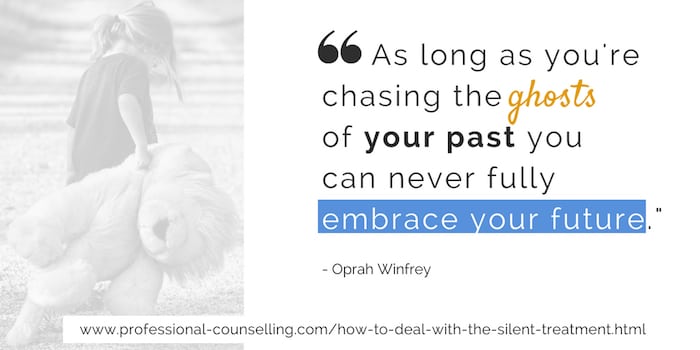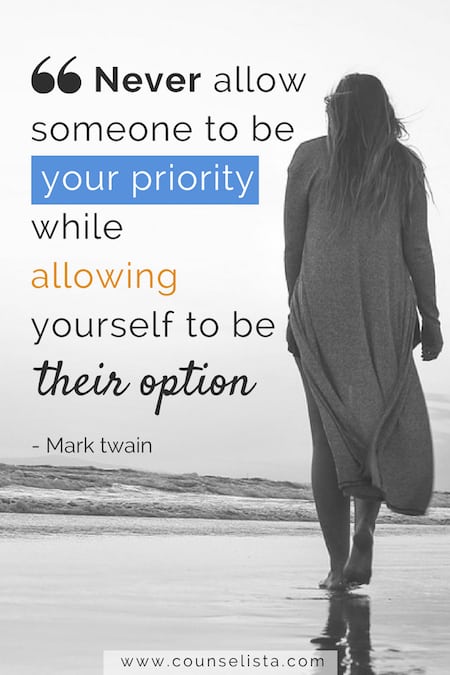Intimate Tickles Thought You Might Be Interested
Published: Thu, 02 Aug 2018 12:59:03 +0000
View Original Article
Category: Better Relationships | Author and Publisher: Elly Prior | First published: 05-06-2018 | Modified: 02-08-2018
When your partner completely ignores you – whether by text, phone or in person
Are you being subjected to the silent treatment? Do you wonder why your partner would want to do that to you? Are you at a loss as to how to deal with it?
I have no doubt that it’s really hurt you. I suspect that you’ve been desperately trying to get him or her to talk to you. You’ve perhaps tried absolutely everything you can think of, simply to get them to acknowledge you again. It’s no wonder if these episodes leave you feeling rejected – the silent treatment is so painful!
So stick with me – I’ll explain it all, and give you some advice on how to handle it. My aim is to help you learn how to deal with the silent treatment effectively, and how to prevent it from happening again.
We’ll be exploring the silent treatment in the context of a close couple relationship – but the theory can be applied to any other personal relationship too.

What is “the silent treatment”?
You’ll sure know what it feels like when someone gives you the silent treatment. They simply stop talking to you – for hours, days or even weeks.
Your partner will ignore you, deliberately avoid and cold-shoulder you. It’s a passive-aggressive way to show that they’re miffed by something you’ve said or done.
Ouch!
So what’s going on – is it the silent treatment, or a poor version of the time-out technique called stonewalling?
The silent treatment
If your partner seems to have stopped talking to you out of the blue or after a fight, clearly the two of you are having a conflict – even if you weren’t aware that you’d done something ‘wrong’. By giving you the silent treatment, your partner wants you to know that he or she is displeased and is intent on punishing you.
Stonewalling
Stonewalling will have started when your partner cut you off in the middle of an argument. S/he will have refused to talk further and may even have abruptly left the room or the house. In this instance, they’re likely to feel overwhelmed – by hurt, frustration or anger. Stonewalling is a defensive move away from danger towards safety. It’s an attempt to prevent themselves or the situation from getting out of control.
Here’s how that works:
Stonewalling is used to shut down the conversation when other strategies (e.g. criticism, contempt and defensiveness) haven’t worked. It is without a doubt detrimental to the relationship, particularly when it becomes a habit. It totally removes the ability for both partners to process the conflict, negotiate, compromise, forgive (even if not forget) and move on.
I want to be upfront with you – I may earn a commission from Better Help. You pay the same fee, regardless.
Is this a one-off, or are you regularly being completely ignored?
Whether you’re on the receiving end of the silent treatment or stonewalling, take a moment to think about what might have caused your partner to behave like this.
Be totally honest with yourself: is it possible that you’ve done something that’s hurt your partner terribly? Or does your partner treat you this way regularly?
Your partner regularly acts as if you don’t exist – by text, phone or in person
If you’re often totally ignored and/or stonewalled and you genuinely can’t see a reason why, it’s likely that your partner is using the silent treatment to manipulate you. In which case, it’s a tactic designed to control your behaviour and is a sign of an abusive relationship. If that feels a little too familiar, then I’d like you to go straight to this article for the help you need right now: Signs of an Abusive Relationship.
It appears to be a one-off
If you can identify some wrongdoing on your part, then it’s likely that your partner could be feeling overwhelmed by hurt and anger. In which case, they may well want you to feel punished for what you’ve done. But refusing to talk to you until they decide when you’ve been punished enough is far from a helpful strategy in a loving relationship!
You don’t have to wait for them to make the first move, though. Here’s what you can do when you know you’re in the wrong…
- Acknowledge their hurt and anger, and the pain your actions have caused (imagine yourself in their shoes)
- Apologise sincerely – without any ifs, buts or excuses
- Ask to be forgiven
- State your love and commitment to them
- Suggest a day and time to have an honest and calm discussion so that you can resolve the situation together
I’d also recommend that you talk it over with a counsellor beforehand (it’s easy to connect with professional help these days). That way, you can work out the best approach and identify anything that could stand in the way of a reconciliation.
Conflicts are inevitable in intimate relationships. But it’s sooo important for the survival of your relationship or marriage that you both learn to deal with and bounce back from the challenges you encounter along the way.
Why would anyone want to deliberately treat you as if you don’t exist?
How might this ever so unhelpful tactic have come about?
Here are a couple of possible explanations…
Childhood learning
It may be that your partner learnt about the silent treatment when they were a child. They may have been subjected to it themselves… which will have given them first hand experience of its effectiveness! They’ll know from personal experience that it can cause you to feel:
- guilty and ashamed.
- confused and full of self-doubt
- afraid of further punishment, rejection and/or angry accusations
- desperate to put right whatever was done wrong
A child whose parent used the silent treatment may well have been raised with other equally unhelpful parenting techniques. So they’re unlikely to have any experience of effective conflict management.
As a child, they might have learnt that the way to be forgiven for doing wrong (and to be loved again) was first to be punished by the silent treatment. Then they’d have bent over backwards in a desperate effort to please the displeased parent and be forgiven for their wrongdoing (perceived or real). In which case, that’s exactly the behaviour they’ll use in their adult life too – and they’ll expect you to bend over backwards to earn their forgiveness.
The silent treatment might also cause a child to become wary of anyone who claims to love them… because being ignored doesn’t exactly feel very loving! So, as an adult, they may have a hard time getting too close to anyone because it can feel too risky. They may never fully able to trust the other’s professions of love, simply because of the mixed messages they got as a child.
Since you’re one half of this relationship, I wonder whether you recognise some of these patterns in yourself too?
Difficulty talking about feelings
Does your partner generally find it difficult to talk about their feelings?
This is a somewhat less damaging scenario if it occurs in an essentially healthy relationship. While I hesitate to generalise, it’s well known that men on the whole find it more difficult to talk about their feelings. They tend to withdraw, preferring to just to move on (or sweep it under the rug!) and focus on the future rather than talk about how they feel. They can also become overwhelmed by emotions and cut themselves off from others as a coping strategy.
These are just two examples of potential reasons why someone might use the silent treatment. But they are by no means an excuse for the way your partner is behaving. Ultimately, the silent treatment is a form of emotional blackmail and manipulation, and is not a healthy way to deal with problems in a relationship. With that in mind, I’d really like you to take a look at my articles on abusive relationships, just to be sure there’s nothing more sinister going on.
How to respond to and prevent the silent treatment
Now that you know a little more about the silent treatment in general, it’s also important for you to know that…
- there are no benefits of the silent treatment
- you have the right to feel safe in your relationship – physically and emotionally
- you are not your partner’s therapist
- you cannot change your partner, and neither should you change yourself to fit in with their demands beyond reasonable compromises
Being on the receiving end of the silent treatment can be pretty upsetting and frustrating. It can make you feel pretty powerless too – but there are ways you can help to resolve the situation. You don’t have to (and indeed you shouldn’t just) wait for things to get better on their own. Here’s how you can deal with it effectively…

5 Things to avoid when you’re being ignored
- Don’t retaliate
Don’t be tempted to use the same tactic in return - Don’t blame yourself
Even if you’ve done something wrong, it’s not appropriate for your partner to punish you by ignoring you. Sure, you have to take responsibility for your mistakes – but your partner needs to behave responsibly too! - Don’t try to please your partner
Remind yourself that you are being mistreated yourself - Don’t plead with your partner
State clearly that you’re prepared to talk when they’re ready, and leave it at that - Don’t excuse their behaviour
Don’t expect or attempt to argue away their manipulative (and emotionally abusive) behaviour. It’s unacceptable – full-stop!
3 Ways of helping yourself
- Look at the bigger picture
Read my articles Signs of Emotional Abuse and Signs of an Abusive Relationship to help you see the bigger picture.
Why?
It’ll help you put this problem in a wider context so that it becomes clear what you’re really dealing with - Reflect on your own boundaries
Decide what you find acceptable, and what isn’t acceptable to you. (Think how your childhood shaped your understanding of how relationships work.)
Why?
You’re likely to be more confident in stating your needs and wants, including deciding when its time to end the relationship - Talk to someone you trust
Ask them just to listen to you. That will help you organise your thoughts.
Why?
It’s likely to disconnect you from the feeling that somehow you’re responsible for your partner’s behaviour. And it may help you to consider whether or not this really is the right relationship for you.
Three ways to help you improve your relationship
- Learn how to argue effectively
Read my article How to Argue Effectively to understand what you can do to encourage healthy problem solving strategies instead of the silent treatment.
Why?
You’ll learn what helpful and effective conflict managements is. Neither one of you should even want to win an argument by being silent the longest! - Take a break
Familiarise yourself with time-out⧉.
Why?
It’s a really useful strategy when you’re feeling too overwhelmed to think straight. And you may be able to agree with your partner that you can both use this approach in the future. - Implement something positive immediately
Familiarise yourself with three healthy relationship tips or strategies which you can implement immediately.
Why?
It will focus your attention on something positive to contribute to the relationship instead of trying to contain the negatives. This is a potential antidote against being ignored completely.
Three ways to help your partner
- Present your partner with the research
They need to know there’s good evidence⧉ that ignoring you is endangering the future of your relationship - Write him or her a letter
Base it on the information in my arguing article. Be sure to express your love for them. Mention how much being ignored is hurting you and how it affects you in other ways. Give it to them when they’re calm and have an opportunity to reflect on it. Be sure to include a link to this article. - If it’s an abusive relationship, leave
Okay, this is more to help yourself than your partner. Although it does give a very clear message that their behaviour is absolutely unacceptable. Be sure not to just threaten to leave as an attempt to manipulate your partner though.
See: How to end your relationship
Finally
Being given the silent treatment is never a pleasant experience. And it’s never a helpful approach, either! At worst, it can be a sign of a toxic relationship. At best, it’s an unhealthy attempt to make upset and displeasure clear, and to provoke guilt and atonement.
The steps above will help you to address this issue with your partner. It may be that he or she has no idea of how much damage they’re doing to your relationship by ignoring you completely. And when they understand the consequences of the silent treatment, they may be willing to work hard at changing their approach. But, if you find your partner is totally unwilling to accept that their behaviour isn’t appropriate, you’ll need to think long and hard about the future of this relationship.
Effective communication is key to any healthy relationship. If there’s no sign of that on the horizon, then you can be sure this isn’t the right relationship for you.
Remember: we’re all human and we all make mistakes. That includes your partner too! But deliberately giving someone the silent treatment isn’t a mistake – and it’s definitely not something you should have to put up with anymore.
Free download
Please, rate this article …
I really hope this article is of help to you. 🙂
I frequently update my articles based on feedback, therefore I really value your vote.
Thank you so much in anticipation. 🙂
Do you need help?
Talk to an online counsellor…
Your problem is never too small or too big, too silly or too complicated to ask for help from a licensed therapist.
They’ll be happy to help…
I want to upfront with you – I may earn a commission from Better Help. You pay the same fee, regardless.
Feel free to ask for help, or comment on this article

Hello you! 🙂
It’s me – Elly Prior, I’m the Founder and Author of this site. I’m a ‘real’ person and I check the comment sections daily.
Do feel free to ask for help. I would gladly write a few lines to help you.
If my article in some way is of help to you, please let me know. I’d be so delighted!
Oh, and English is not my native language (I lived in the UK for many years). Whilst my articles are edited, my comments here are spontaneous and unedited.
